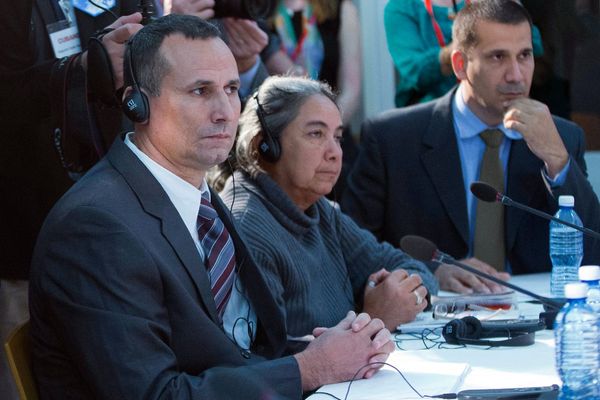
If one looks only at the pound, the governor of the Bank of England, Andrew Bailey, scored a small victory with his statement on Monday about not hesitating to raise interest rates. His line was little more than a weak holding position, but Tuesday’s action in currency markets was mostly calm during London trading hours.
Sterling was a shade under $1.08 against the dollar in late-afternoon – not good, but no worse than 24 hours earlier. Huw Pill, the Bank’s chief economist, even got through an arranged speech without upsetting the applecart any further.
The problem for Bailey, though, is threefold. First, currency markets never pause for breath: sub-$1.07 was seen at 6pm. Second, the next meeting of the Bank’s monetary policy committee (MPC), which sets interest rates, is not until 3 November, five weeks away. If the MPC is really disinclined to raise rates outside its normal policy-setting timetable, as Pill confirmed, that is a long time to be a hostage to events.
The third problem is the most serious: sterling isn’t the Bank’s main headache. The real throbbing pain is being delivered from the gilt markets, where Tuesday’s prices were alarming. The yield on 10-year government debt surged to 4.5%, having been 4.1% on Monday and 3.1% at the start of last week.
Those are extraordinary rapid rises and they feed directly into the cost of borrowing for households and companies. Witness the chaotic yanking of fixed-rate mortgage offers by many big high street lenders: the market is moving too fast for them to keep up. The 10-year gilt yield is now more than twice the equivalent borrowing cost for Germany as investors assess how far the Bank is behind the curve on inflation-fighting, and how hard it will have to hike.
Can Threadneedle Street really stand pat for five weeks, with its leading figures merely delivering bland speeches? It feels increasingly unlikely.
UK stocks crushed by ‘weakening’ economy
Still, at least UK stock markets are holding up, right? Well, no. The FTSE 100 index has an appearance of normality as it hovers around the 7,000 mark, but that is mostly because its top end is stuffed with mining, oil and pharma firms that make the bulk of their revenues in dollars. Pure UK stocks were crushed on Tuesday: Rightmove down 9%, the housebuilder Taylor Wimpey off 7%, and British Land 5% lower.
The FTSE 250 index – the next level down in terms of market capitalisation and far more domestically focused – fell a mighty 2.36%. Virtually its sole bright point was Biffa, the waste management firm, which was up 28% as its board accepted a £1.3bn takeover bid from a US private equity firm.
Note, though, that the offer for Biffa was below the previously advertised proposal from June – 410p versus 445p. The chairman cited “a weakening economic environment” as the reason for rolling over at the reduced price. A quiet devaluation of UK plc is under way.
Shorters take a long view
An iron rule of financial crises says that sooner or later the spotlight turns on supposedly wicked speculators. So it is in the current round of turmoil as, in entirely unsurprising news, it turns out that a few hedge fund managers were betting against the great British pound. These pin-stripped robbers should be burned at the stake, say a few Tory MPs, or at least pilloried in the Daily Mail for their lack of patriotism.
It’s nonsense. Speculation is a normal part of the ebb and flow of financial markets – and short-selling plays a legitimate role. In stock markets, shorters hunt for bubbles, overvalued assets and frauds, and we should be glad they do. In the price-setting business, they are an excellent counter to the usual hype machine.
The useful purpose served by the vigilantes of the bond market, close cousins of currency speculators, is to call time on government or central bank policies perceived as excessively inflationary, profligate or incoherent.
Of course, speculators can be wrong – indeed, many will also have lost a packet in recent days by being long of the pound. But the shorters will have proceeded from any number of reasonable analyses: that containing inflation in the UK will be trickier than generally believed; that current policies lack credibility; that risk aversion is growing.
Some, as Tory backbenchers could reflect, may even be long-term believers in Project Truss but still think it risks a backwards step in the short-term for the currency. Either way, do not shoot people for having a view.







